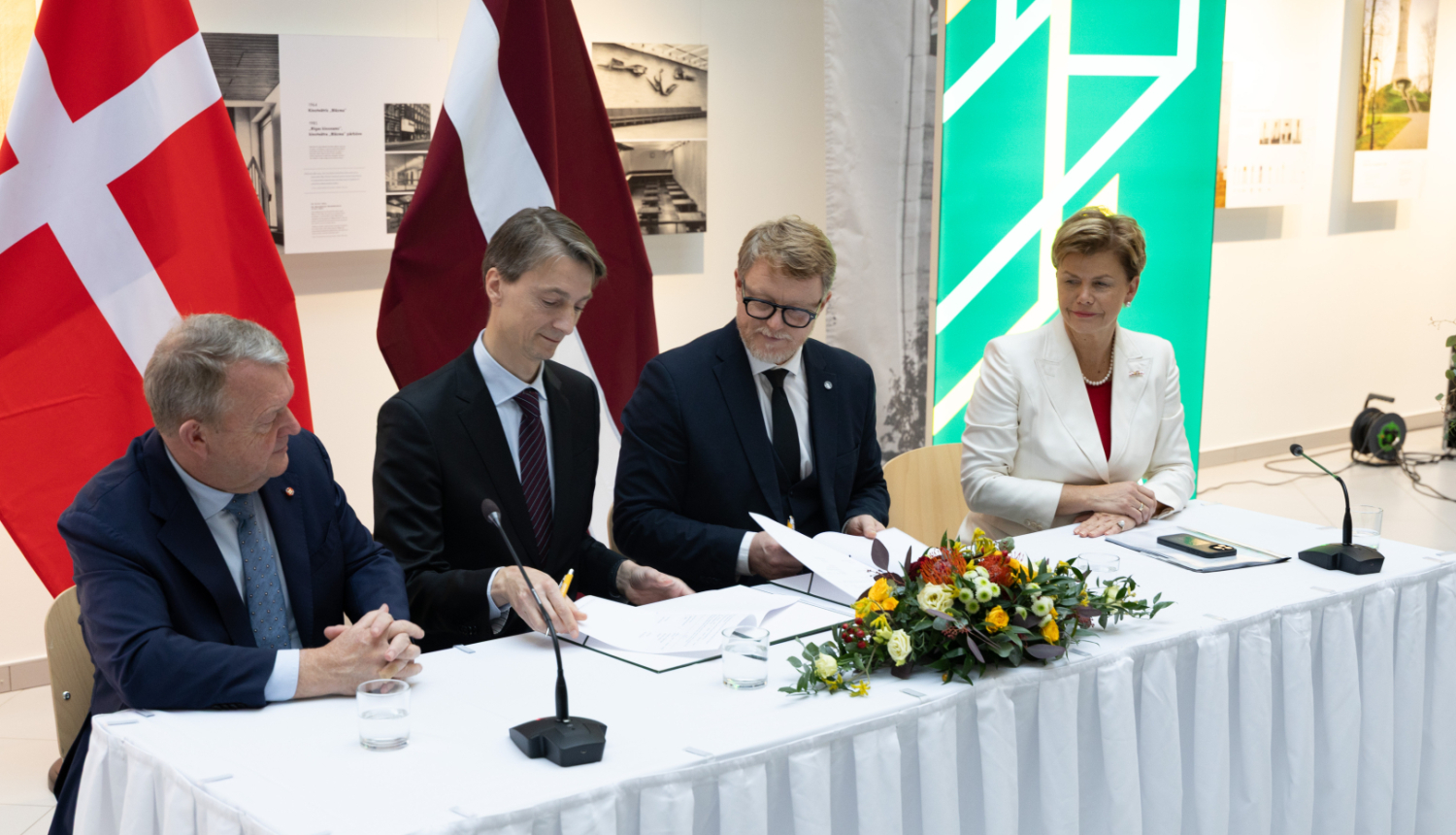On 28 October 2025, in the presence of the Ministers of Foreign Affairs of Latvia and Denmark, a Memorandum of Understanding for cooperation in the field of quantum technologies was signed between Riga Technical University and the Niels Bohr Institute in Denmark. The signing of the Memorandum of Understanding will open up wider opportunities for strengthening Latvia’s and Denmark’s excellence in the EU and NATO, and to continue the development of quantum technologies for both civilian and military (defence) uses. The memorandum also provides for student exchange to motivate in-depth studies of quantum technologies.
Foreign Minister Baiba Braže:
“Things our countries have in common in the field of quantum technologies are our outstanding scientists and their achievements; besides, Latvia and Denmark are the only ones from among the Baltic and Nordic countries (NB8) invited to take part in the development of the future EU Quantum Internet Strategy. It is important for us to cooperate both in quantum science and in its commercialization.
The usability of new technologies, including quantum technologies, in security and defence is becoming increasingly important in the current geopolitical situation. Thanks to quantum technologies, it is possible to more quickly and effectively identify and prevent various hybrid threats, which are becoming increasingly aggressive and intense. For example, quantum technologies allow for independent navigation capabilities in the event of GPS interference (for aircraft, ships), as well as predicting the risk of deliberate ruptures of undersea cables as early as possible and more accurately.
Latvia’s outstanding achievements in the field of quantum technologies have been internationally recognized in all three main areas of quantum technology – the development of quantum algorithms, the development of quantum sensors and quantum communications. Up to 20% of the world’s quantum algorithms are based on algorithms developed by Latvian professors, and Latvia is the first of the Baltic states to have implemented a national quantum-secure communication network – this is a bold and visionary step for our entire region. In the future, we want to be even more involved in practical quantum application projects, and the Memorandum of Cooperation signed today will also provide Latvia with such opportunities.”
Baiba Braže underlines that early in 2026, Latvia will host the world’s largest annual Quantum Information Processing Conference, QIP 2026.
Foreign Minister Baiba Braže and the Danish Foreign Minister Lars Løkke Rasmussen discussed bilateral and regional (NB8) cooperation, work in NATO and other international formats, as well as security and defence issues. This was the first bilateral meeting between the two foreign ministers.
“I would like to thank Denmark for its contribution to strengthening security in our region – for the participation of the Danish battalion in NATO’s multinational brigade in Ādaži and the leadership of the NATO Multinational Division North as well as for Denmark’s active role in coordinating cooperation on foreign affairs in NB8. I greatly appreciate Denmark’s current assistance to Ukraine – the military, financial and political support to repel Russian aggression, including by strengthening sanctions and combating the shadow fleet. We discussed priorities for work in the United Nations Security Council – in 2026, Latvia and Denmark will work together on the council,” Baiba Braže noted.
The Danish Foreign Minister Lars Løkke Rasmussen has arrived in Latvia to accompany His Majesty King Frederik X and Her Majesty Queen Mary of Denmark on a state visit.
Further information
- The Niels Bohr Institute was founded in 1921 as the Institute for Theoretical Physics at the University of Copenhagen, thanks to the initiative of the Danish physicist and Nobel Prize laureate Niels Bohr. The research at the Niels Bohr Institute spans a broad spectrum of disciplines and fields – quantum technologies: quantum computers, quantum communication and quantum sensors; high-energy physics: fissionable particles, including in the ALICE and ATLAS experiments at CERN; astrophysics: the structure of the universe, dark matter and energy; nanophysics and biophysics: nanomaterials and viable systems; earth and climate physics – Arctic science and climate change.
- University of Latvia tenured professor Andris Ambainis is one of the world’s leading scientists in the field of quantum algorithm development. Algorithms developed by Professor Ambainis and Associate Professor Aleksandrs Belovs form the basis for up to 20% of all quantum algorithms globally. Quantum sensors developed by Professor Mārcis Auziņš are in demand across European and transatlantic-level projects. In the field of quantum communications, key contributions to building Latvia’s national quantum communication network have come from: Professor Jurģis Poriņš (Riga Technical University); Associate Professor Leo Trukšāns (University of Latvia, and Chief Quantum Encryption Engineer at the Latvian State Radio and Television Centre); scientists at the Institute of Mathematics and Computer Science (University of Latvia), as well as the company TET. Latvia is the first Baltic state to establish a national quantum-secure communication network. Tenured professor Vjačeslavs Kaščejevs from the University of Latvia has also earned international acclaim in the field of quantum nanoelectronics.
- At the QuantERA Strategic Conference in Amsterdam in 2024, Latvia ranked first in Europe in terms of the number of QuantERA project coordinators per capita (GDP-based), with three represented projects. This ranking was based on data submitted by Latvia covering the period since 2019.
- In 2024, the Institute of Solid State Physics at the University of Latvia began work on the European project “Towards a Centre of Excellence in Quantum Photonics in Latvia”. The project involves collaboration between the University of Latvia, Riga Technical University, University of Trento (Italy), and University of Technology of Troyes (France).
- At the beginning of 2026, Latvia is set to host the internationally significant Annual Quantum Information Processing Conference (QIP2026). The University of Latvia earned the right to organise this event through a global open competition.
- The first students in Latvia have now completed newly introduced study modules dedicated to quantum technologies – both at the University of Latvia and Riga Technical University.




